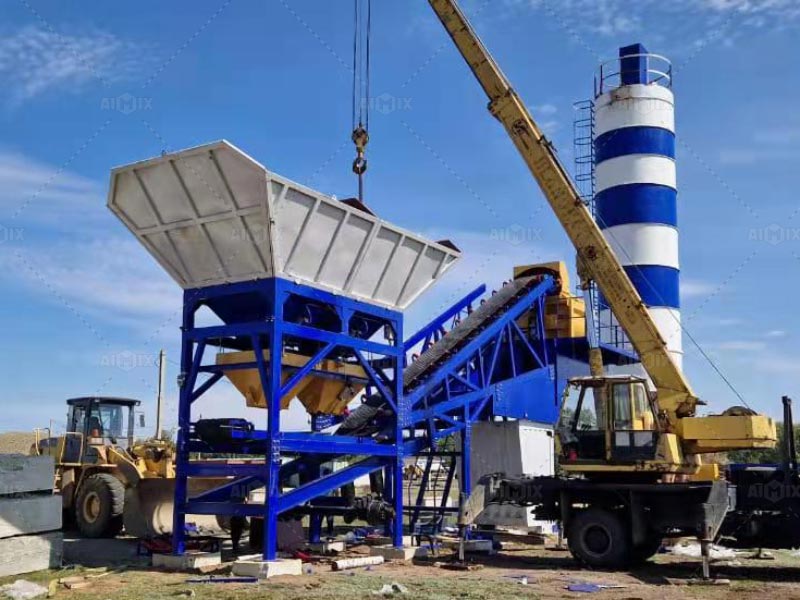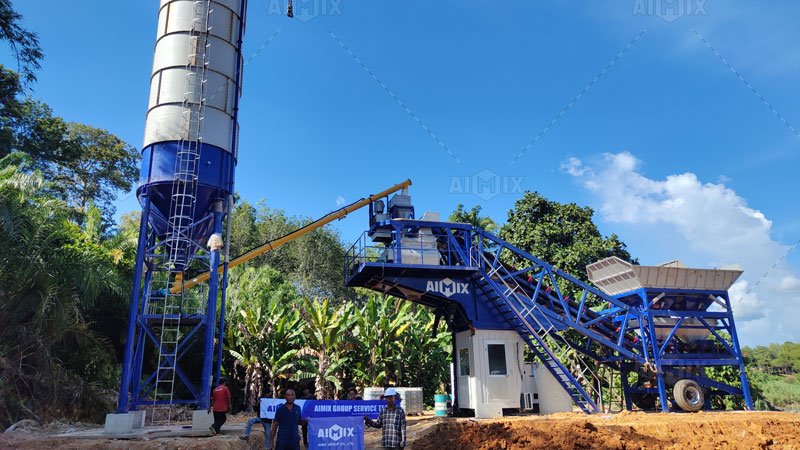In the construction industry, the right equipment can make a significant difference in terms of efficiency, cost savings, and overall project success. One of the most valuable assets for many contractors and construction companies is the mobile concrete plant. This type of concrete plant offers flexibility and cost advantages, especially when compared to traditional stationary plants. In this article, we will explore the key cost benefits of investing in a mobile concrete plant and why it might be the best solution for your next construction project.
What Is a Mobile Concrete Plant?
A mobile concrete plant, also known as a portable concrete batching plant, is a compact and transportable version of the traditional concrete mixing plant. Unlike stationary plants, mobile concrete plants(plantas móviles de concreto) are designed to be quickly moved from one site to another, allowing for on-site concrete production. This eliminates the need to transport ready mix concrete over long distances, reducing transportation costs and project delays.
Key Features of a Mobile Concrete Plant
- Portability: These plants can be easily transported and set up at different project sites.
- Quick Installation: Mobile concrete plants are designed for fast installation and operation, usually within a matter of days.
- On-site Production: They allow for the production of fresh concrete directly at the job site, ensuring better quality and reducing waste.

Initial Cost Savings
One of the primary advantages of investing in a mobile concrete plant is the lower initial cost compared to stationary plants. Mobile concrete plants typically have a smaller footprint and require less foundation work, which translates into reduced setup and installation costs. The compact size and ease of assembly mean that contractors can save both time and money during the initial phase of setting up the ready mix plant(instalación de planta de concreto premezclado).
Lower Transportation Costs
Transportation of ready mix concrete from a stationary plant to the construction site can be both time-consuming and expensive, especially if the site is located in a remote area. With a mobile concrete plant, contractors can eliminate this cost entirely by producing concrete directly on-site. This not only saves money on transportation but also reduces the risk of delays caused by traffic or other logistical issues.
Less Labor-Intensive Setup
The installation of a stationary concrete plant often requires a significant amount of labor and specialized equipment to build a strong foundation and set up all the necessary components. A mobile concrete plant, on the other hand, is much easier and faster to install, requiring fewer workers and reducing labor costs. This makes it an attractive option for projects that need to get up and running quickly without the high upfront labor expenses.
Ongoing Cost Benefits
Beyond the initial cost savings, mobile concrete plants(plantas de concreto móviles en Perú) provide long-term financial advantages by streamlining the concrete production process and offering flexibility for future projects.
Reduced Concrete Waste
When concrete is mixed at a stationary plant and transported to a job site, there is a risk that the concrete will set or harden during transit, leading to waste. With a mobile concrete plant, concrete is produced as needed directly at the site, ensuring fresh, high-quality concrete with minimal waste. This not only improves efficiency but also cuts down on the costs associated with wasted materials.
Increased Project Flexibility
Mobile concrete plants offer greater flexibility, allowing contractors to move the plant from one project to another with ease. This flexibility is particularly beneficial for companies that work on multiple small or medium-sized projects simultaneously. Instead of relying on third-party suppliers or transporting concrete from a distant location, contractors can produce their own concrete on-site, reducing dependency and cutting operational costs.

Enhanced Project Efficiency
The ability to produce fresh concrete on-site improves overall project efficiency. By eliminating the need to wait for deliveries of ready-mix concrete from a distant concrete mixing plant(AIMIX planta mezcladora de concreto), contractors can ensure that construction timelines are met and projects are completed on schedule. This efficiency translates to cost savings, as delays are minimized, and work can continue without interruption.
Better Quality Control
Producing concrete on-site also allows for greater control over the quality and consistency of the mix. Contractors can adjust the mix as needed to meet the specific requirements of each project. This eliminates the potential for errors in delivery and ensures that the concrete meets the necessary standards, avoiding costly rework or project delays due to poor-quality materials.
Long-Term Investment Benefits
While the initial investment in a mobile concrete plant may be lower than that of a stationary plant, the long-term benefits make it an even more attractive option for many contractors. The mobility of these plants allows for greater adaptability, ensuring that the equipment can be used for multiple projects over time, maximizing its return on investment.
Resale Value
Mobile concrete plants typically hold their value well, meaning that even after several years of use, contractors can resell them at a reasonable price. This helps offset the initial investment and makes a mobile concrete plant a smart long-term asset for any construction business.
Conclusion
Investing in a mobile concrete plant offers numerous cost advantages for contractors and construction companies. From the lower initial setup costs to the long-term savings on transportation, labor, and material waste, a mobile concrete plant is a practical solution for a wide range of construction projects. Additionally, the flexibility and adaptability of these plants provide a high return on investment, making them an excellent choice for businesses looking to improve their project efficiency and profitability.
Whether you’re working on small-scale jobs or large infrastructure projects, a mobile concrete plant can provide the versatility and cost-effectiveness needed to stay competitive in today’s construction industry.